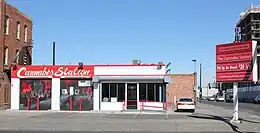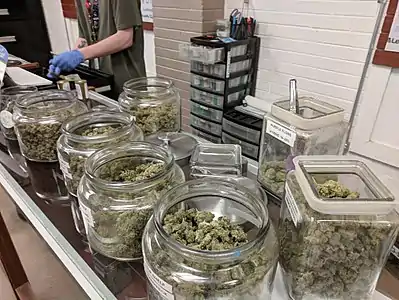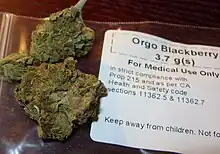

Cannabis dispensaries in the United States or marijuana dispensaries are a local government-regulated physical location, typically inside a retail storefront or office building, in which a person can purchase cannabis and cannabis related items for medical or recreational use. First modeled in Amsterdam in the late 1970s where they were innocently called coffee shops, it would take the Americans more than a generation to successfully duplicate the idea of a retail cannabis storefront. Unlike in the Dutch coffee shops, today most dispensaries do not allow for the smoking or other consumption of cannabis. However, some dispensaries (such as some in California) do have legal permission to set up "cannabars" to allow onsite consumption.
In a traditional medical cannabis dispensary store a patient receives cannabis medication as allowed per the patient's doctor's recommendation.[1] These dispensaries sell cannabis products that have not been approved by the FDA and are not legally registered with the federal government.[2]
As of 2021 there are state regulated marijuana dispensaries in Alaska, Arizona, Arkansas, California, Colorado, Connecticut, Delaware, the District of Columbia, Florida, Hawaii, Illinois, Louisiana, Maine, Maryland, Massachusetts, Michigan, Minnesota, Missouri, Montana, Nevada, New Hampshire, New Jersey, New Mexico, New York, North Dakota, Ohio, Oklahoma, Oregon, Pennsylvania, Rhode Island, Utah, Vermont, Virginia, and Washington. In California, Native American gaming operations are also intended to include dispensaries going forward.[3]
A cannabis dispensary differs from similar retail stores known as head shops, in that only state licensed cannabis dispensaries are authorized to sell cannabis.[4]
Approximately 12 US States have drive thru capabilities. These states include; California, Colorado, Illinois, Maryland, Michigan, Nevada, New Jersey, Pennsylvania, Oklahoma, Oregon, Utah, and Washington[5][6]
History
The first dispensary San Francisco Cannabis Buyers Club was founded in 1992 by Proposition 215 coauthors "Brownie Mary" Rathbun, Dennis Peron and Dale Gieringer.[7]
Washington state became the second state in the U.S. to develop a regulatory framework for marijuana dispensary operators improving the access to cannabis patients beyond the caregiver model.[8]
The term "marijuana dispensary" in the United States is most often used to refer to private organizations or companies that sell cannabis, particularly in the states of California, Colorado, Washington and Oregon. "Cannabis dispensary" is starting to become a more politically correct term as conscientious people prefer the use of the word cannabis which avoids using the more common Spanish slang word "marijuana".
Medical dispensaries
Thirty seven of the United States regulate some form of medical cannabis sales despite federal laws.[9] As of 2016 seventeen of those states (Arizona, California, Colorado, Connecticut, Delaware, Illinois, Maine, Michigan, Montana, Nevada, New Jersey, New Mexico, New York, Oklahoma, Oregon, Rhode Island, Washington, and Washington, D.C.) have at least one medical marijuana dispensary, with varying product laws.[10]
The medical dispensaries in these states buy their exit shop products (excluding medical marijuana), like child proof safety bags, and in-store storage products, from a plethora of new manufacturing companies in mainly China via importers based in the U.S.
The growing need of dispensaries to comply with various legislative laws has given birth to thousands of new products ranging from vials with child locks on them to, to pop top bottles that are childproof[11] and even childproof joint tubes.
For example, according to Title 16 C.F.R. 1700 of the Poison Prevention Packaging Act[12] in Washington, any marijuana products, whether they are edibles, concentrates, or waxes that can be consumed either by inhaling or swallowing must be sold in child resistant packaging.
Recreational dispensaries
Colorado was the first state to license a Recreational Dispensary, with 37 stores licensed to sell to adults 21+ on January 1, 2014. The first customer on record to legally purchase marijuana was Sean Azzarati, an Iraq war veteran, who was raising awareness for the cause that PTSD was not a "qualifying condition" for a medical marijuana recommendation in Colorado at the time (PTSD was added to the list of qualifying conditions in 2017).[13]

As of March 2021, eleven states regulate recreational dispensaries. They are Alaska (Alaska Measure 2 (2014)), Arizona (2020 Arizona Proposition 207), California (2018), Colorado (Colorado Amendment 64), Illinois (2020), Maine (2020), Massachusetts (2018), Nevada (2017), Oregon (Oregon Ballot Measure 91 (2014)), Michigan, and Washington (Washington Initiative 502).[14] These are stores where any adult 21+ can enter to purchase cannabis and or cannabis smoking accessories.
Notable dispensaries
Harborside Health Center, Oakland and San Jose, California describes itself as the "largest pot shop" in California[15] and was featured in a four-part reality show.[16]
An economic impact study conducted by the University of Denver examined the Colorado Harvest Company dispensary chain's contribution to tax revenue, jobs, and income to Denver and the state of Colorado.[17]
Kind for Cures was the first shop to make national press by taking over a defunct KFC.[18]
Coachella Valley Church in San Jose, California made national headlines by offering sacramental marijuana to their members.[19]
MedMen's operation grew to include thousands of employees, dozens of retail locations across multiple states in addition to processing and grow facilities; MedMen aims to be the “Apple Store” of weed.[20]
Locating services
As dispensaries grow in popularity, several locating services have been created such as NearGreen, Leafbuyer, Weedmaps, Texas Weed Syndicate, Merry Jane and Leafly[21]
.jpg.webp)
Case law
In popular culture
Weed Wars is a four-part reality show broadcast on the Discovery Channel which highlights the Harborside Health Center in Oakland California, a medical marijuana dispensary.[22]
The third episode of the 14th season of South Park is named "Medicinal Fried Chicken" and contemplates a marijuana dispensary taking over a recently closed fast-food chicken restaurant named "KFC".
Popular American comedian D. L. Hughley's short lived and controversial news program on CNN ends with the artist visiting a California dispensary to treat back pain.
References
- ↑ Lee V. Barton (2007). Illegal Drugs and Governmental Policies. Nova Publishers. p. 69. ISBN 978-1-60021-351-9.
- ↑ Brian F Thomas; Mahmoud ElSohly (2015). The Analytical Chemistry of Cannabis: Quality Assessment, Assurance, and Regulation of Medicinal Marijuana and Cannabinoid Preparations. Elsevier Science. p. 83. ISBN 978-0-12-804670-8.
- ↑ https://www.fresnobee.com/news/local/article257934393.html
- ↑ David Neubauer; Stephen Meinhold (2013). Judicial Process: Law, Courts, and Politics in the United States. Cengage Learning. p. 108. ISBN 978-1-133-71178-0.
- ↑ Ryser, Rob (May 5, 2021). "Medical marijuana dispensary moving to Danbury hopes to make use of drive-thru opportunity". Newstimes.
- ↑ "Drive-Thru Dispensaries - the New Normal?".
- ↑ David M. Fahey; Jon S. Miller (2013). Alcohol and Drugs in North America: A Historical Encyclopedia: A Historical Encyclopedia. ABC-CLIO. p. 124. ISBN 978-1-59884-479-5.
- ↑ History of Washington State marijuana laws http://www.ncsl.org/documents/summit/summit2015/onlineresources/wa_mj_law_history.pdf National Conference of State Legislators
- ↑ Ann O’M. Bowman; Richard C. Kearney (2015). State and Local Government. Cengage Learning. p. 67. ISBN 978-1-305-38847-5.
- ↑ "State Medical Marijuana Laws". National Conference of State Legislatures. 2016. Retrieved January 24, 2016.
- ↑ "Child Resistant Pop Top Bottles Dispensary Supplies". dispensarynecessities.com. Archived from the original on April 26, 2018. Retrieved April 26, 2018.
- ↑ "WAC 314-55-105: Packaging and labeling requirements". apps.leg.wa.gov. Retrieved April 26, 2018.
- ↑ "World's first legal recreational marijuana sales begin in Colorado". The Denver Post. January 1, 2014. Retrieved October 23, 2022.
- ↑ Guido H. Stempel III; Thomas K. Hargrove (2015). The 21st-Century Voter: Who Votes, How They Vote, and Why They Vote [2 volumes]. Ohio University. p. 272. ISBN 978-1-61069-228-1.
- ↑ "Harborside Health Center Lawsuit: Judge Dismisses Oakland's Suit On Behalf Of Pot Shop". The Huffington Post. February 19, 2013. Retrieved January 22, 2016.3
- ↑ "World's Largest Medical Marijuana Dispensary" December 1, 2011. Weed Wars, Discover Channel 2011
- ↑ Strauss, Jack. "The Economic Impact of Colorado Harvest Company and Evergreen Apothecary on the Denver Region and Colorado". Retrieved April 20, 2017.
{{cite journal}}: Cite journal requires|journal=(help) - ↑ John Geluardi (2016). Cannabiz: The Explosive Rise of the Medical Marijuana Industry. Taylor & Francis. p. 71. ISBN 978-1-317-26282-4.
- ↑ Ostrov, Barbara (December 22, 2017). "At 'pot churches,' marijuana is the sacrament". www.usatoday.com. Retrieved August 9, 2019.
- ↑ Sevack, Brendan (December 22, 2019). "Top Cannabis Names". brandbucket.com. Retrieved December 7, 2021.
- ↑ Nate Linhart (2016). "Medical marijuana lobbyist fights recreational marijuana initiative". Suntimes. Retrieved January 24, 2016.
- ↑ McKay, Hollie (December 8, 2011). "'Weed Wars' Goes Inside Medical Marijuana Dispensary". Fox News. Retrieved January 22, 2016.
Further reading
- The Associated Press (2015). Marijuana Nation: The Legalization of Cannabis Across the USA. Mango Media Inc. ISBN 978-1-63353-037-9.
- Bruce Barcott (2015). Weed the People: The Future of Legal Marijuana in America. Time inc. ISBN 978-1-61893-607-3.
External links
- Medical marijuana facilities - State of Colorado
- Frequently requested lists - Washington State Liquor and Cannabis Board
